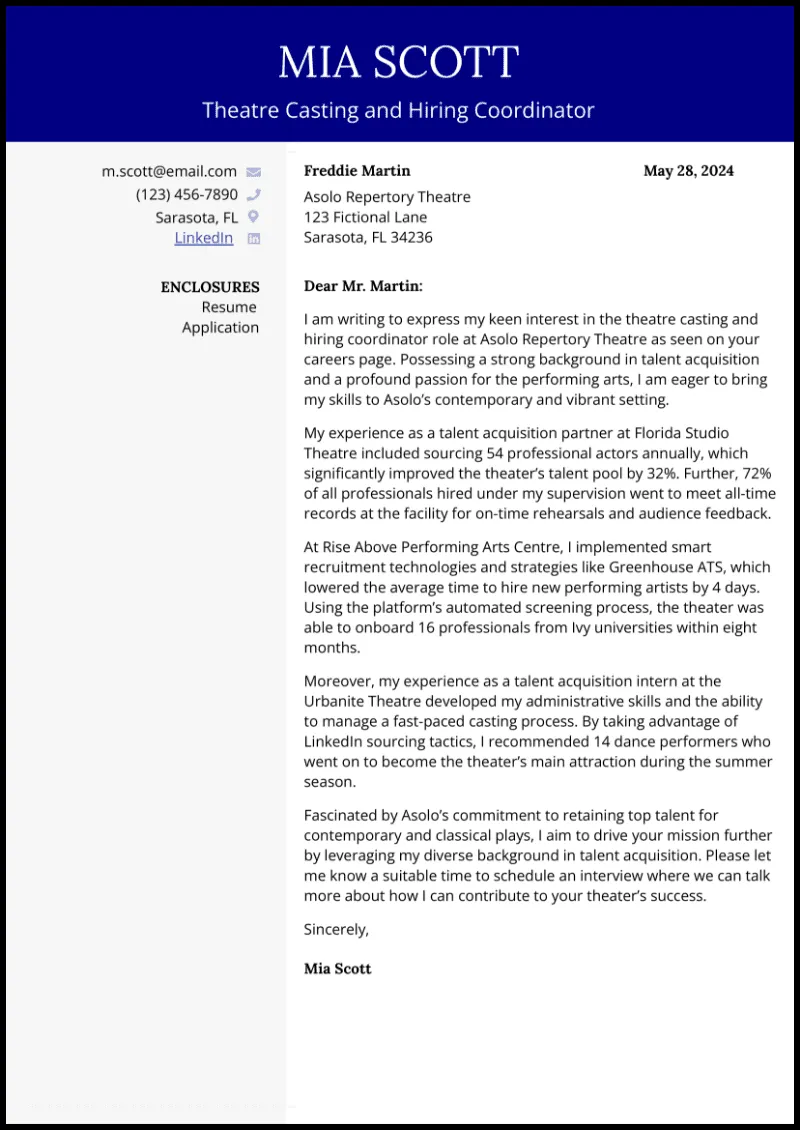Why an Entertainment Cover Letter Matters
In the dynamic world of entertainment, a cover letter isn’t just a formality; it’s your opening act. It’s your chance to make a memorable first impression and showcase your passion, skills, and understanding of the industry. Unlike resumes, which provide a static overview of your experience, a cover letter allows you to tell your story, highlighting why you’re the perfect fit for a specific role or company. A well-crafted cover letter demonstrates your genuine interest, your personality, and your ability to communicate effectively, all crucial elements in the entertainment sector.
Understanding the Entertainment Industry
Before you even begin to write, it’s essential to understand the multifaceted nature of the entertainment industry. This sector encompasses film, television, music, theatre, gaming, and digital media, each with its unique requirements and competitive landscape. Researching the specific segment you’re targeting, familiarizing yourself with industry trends, and understanding the companies you’re applying to are crucial steps. The more informed you are, the better you can tailor your cover letter to resonate with the hiring manager and demonstrate your genuine interest and knowledge of the field.
Key Skills for Entertainment Professionals
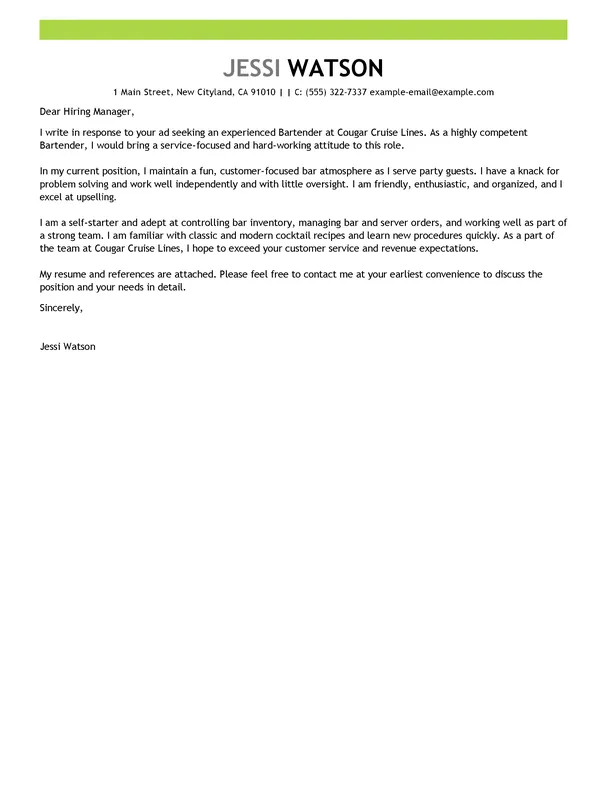
The entertainment industry demands a blend of hard and soft skills. While technical expertise is crucial for many roles, it’s equally important to possess strong communication, teamwork, and problem-solving abilities. Creativity, adaptability, and the ability to thrive under pressure are also highly valued. Identify the skills most relevant to the position you’re applying for and showcase them in your cover letter. Highlight your ability to work collaboratively, meet deadlines, and contribute to a creative environment. Tailoring your skills to the specific job requirements will make you stand out.
Crafting a Compelling Cover Letter
Now that you’ve grasped the importance and the industry, it’s time to craft a cover letter that grabs attention. The aim is to showcase your personality, your drive, and your suitability for the role. This is where you demonstrate that you’ve gone the extra mile to understand the role and the company’s ethos. Avoid generic templates; your cover letter should be as unique as you are, reflecting your individual strengths and passion for the entertainment industry.
Header and Contact Information
Start with a professional header that includes your full name, contact information (phone number, email address), and, optionally, a link to your online portfolio or professional website. Ensure your contact details are accurate and up-to-date. This section should be clean and easy to read, allowing recruiters to quickly find your contact information. A well-formatted header demonstrates attention to detail, a valuable trait in the entertainment industry.
Personalized Greeting
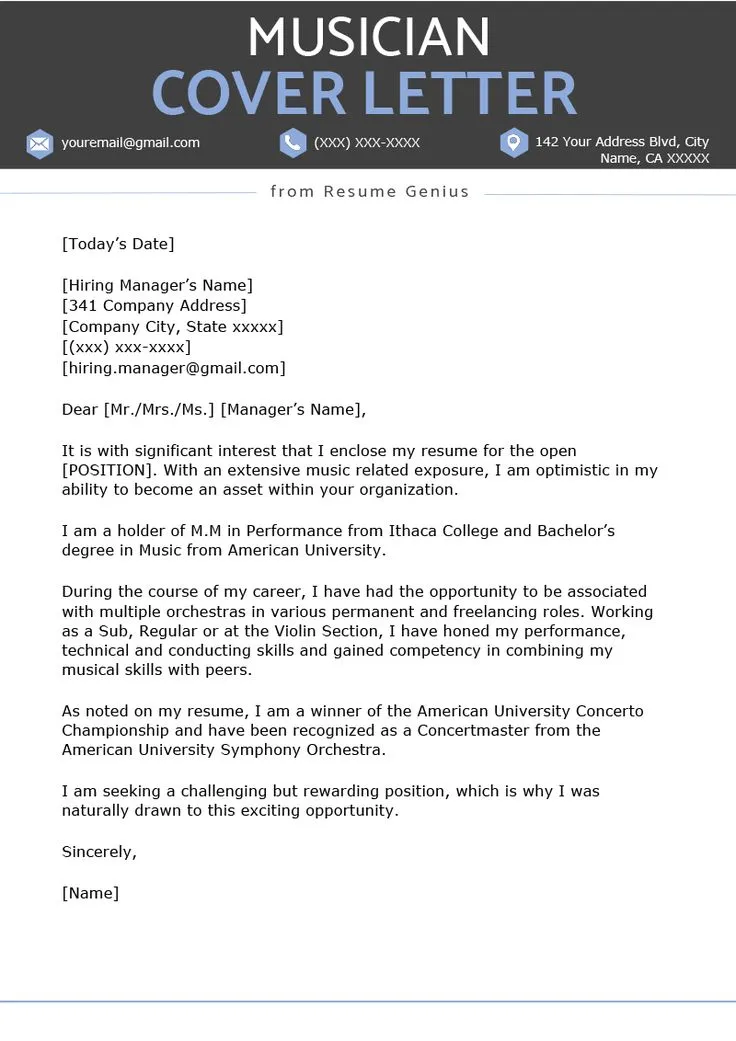
Always address your cover letter to a specific person whenever possible. Research the hiring manager or the person responsible for reviewing applications and use their name in your greeting. This personalized touch shows that you’ve done your homework and are genuinely interested in the opportunity. If you can’t find a specific name, use a professional salutation like ‘Dear Hiring Manager’ or ‘Dear [Department Name] Team’. Avoid generic greetings like ‘To Whom It May Concern’.
The Opening Paragraph Grab Attention
The opening paragraph is your elevator pitch. Capture the reader’s attention immediately by stating the position you’re applying for and, concisely, why you’re a great fit. Mention your passion for the entertainment industry and highlight a key accomplishment or skill that aligns with the job requirements. Make your opening sentence compelling and memorable, demonstrating enthusiasm and a clear understanding of the role and the company’s needs. Show your understanding of the job requirements.
Highlighting Relevant Experience
The core of your cover letter should showcase your relevant experience. Instead of simply listing your past roles, provide specific examples of your accomplishments and how they relate to the job you’re applying for. Use the STAR method (Situation, Task, Action, Result) to illustrate your contributions and the impact you made in previous positions. This approach allows you to provide concrete evidence of your skills and abilities.
Showcasing Skills and Achievements
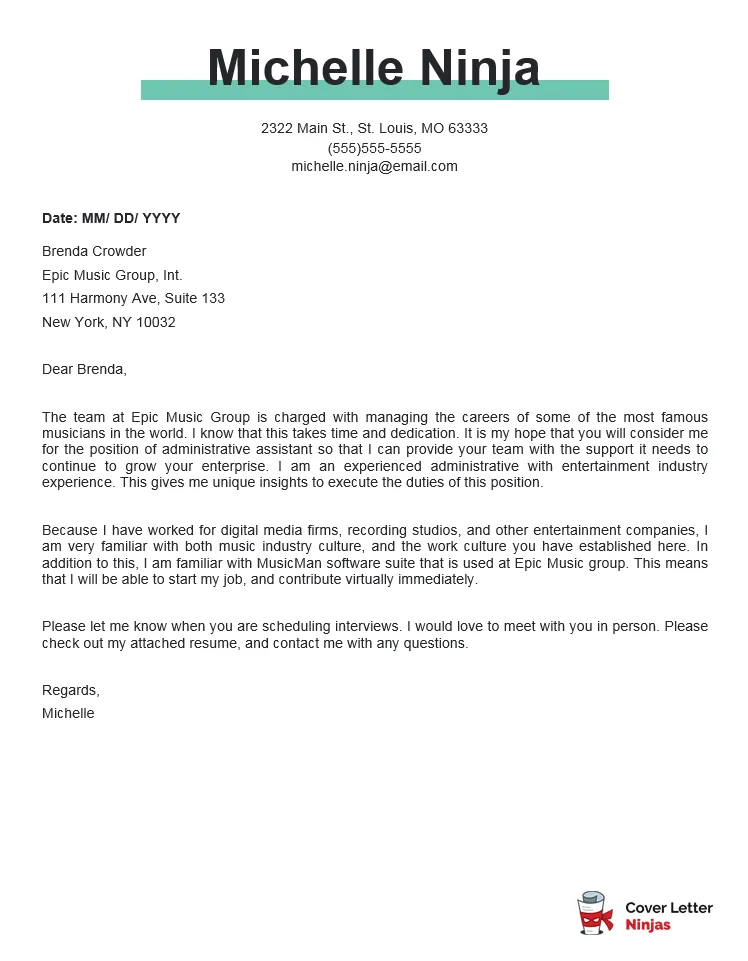
Focus on showcasing your skills and achievements that are most relevant to the target position. Tailor your descriptions to match the job description, emphasizing the skills and experiences the employer is seeking. Highlight accomplishments that demonstrate your ability to contribute to the company’s success. Use action verbs and quantify your achievements whenever possible to make your claims more impactful.
Quantifying Accomplishments
Whenever possible, quantify your achievements. Use numbers, percentages, or specific metrics to demonstrate the impact of your work. For example, instead of saying ‘Increased social media engagement,’ say ‘Increased social media engagement by 30% in six months.’ Quantifying your accomplishments adds credibility and helps employers understand the value you bring to the table. Provide evidence of your value, that is your key value as a potential employee.
Tailoring the Letter to the Role
Customizing your cover letter for each job application is crucial. Generic cover letters are easily recognizable and often get overlooked. Take the time to research the company, understand the specific requirements of the role, and tailor your letter to reflect your understanding of the company’s needs and your ability to meet them. This effort demonstrates your genuine interest and commitment to the position.
Researching the Company
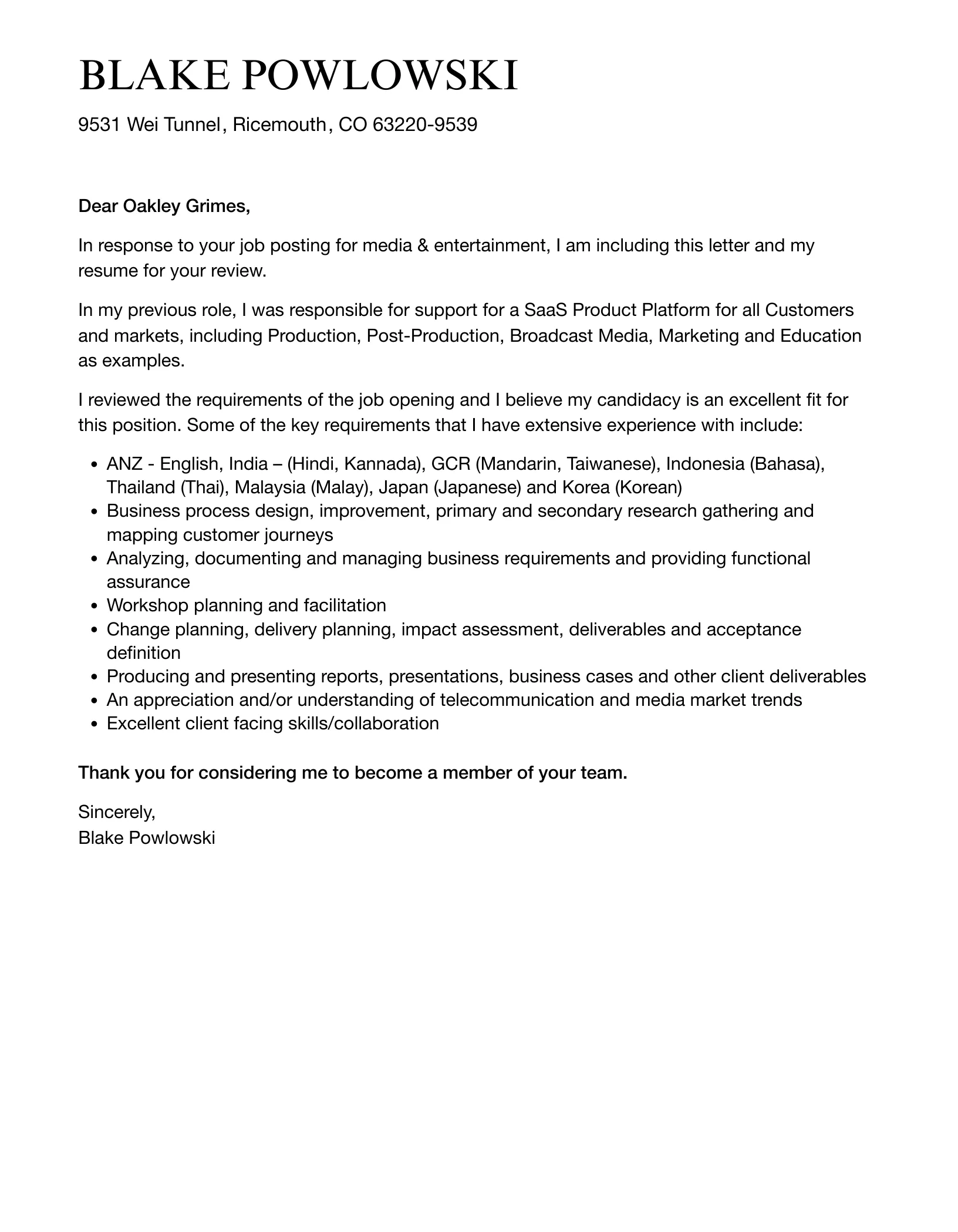
Before writing your cover letter, thoroughly research the company. Understand their mission, values, recent projects, and any news or developments that might be relevant to the role. This research will help you tailor your cover letter to align with the company’s culture and demonstrate your knowledge of their work. Visit their website, explore their social media presence, and read industry news to gather information. This ensures that you understand what the company stands for.
Matching Skills to Job Requirements
Carefully review the job description and identify the key skills and qualifications the employer is seeking. Highlight your relevant skills and experiences, providing examples of how you’ve demonstrated those skills in the past. Use keywords from the job description throughout your cover letter to demonstrate that you meet the required criteria. This alignment increases your chances of making a positive impression on the hiring manager.
Formatting and Tone
The tone and formatting of your cover letter are crucial for making a professional impression. Choose a clean, easy-to-read font and use proper grammar and spelling. Maintain a professional and enthusiastic tone throughout your letter, reflecting your passion for the entertainment industry. Ensure the formatting is consistent and visually appealing. Consider the company’s culture when selecting a tone; a more casual tone might be appropriate for a creative agency, while a more formal tone might be better for a corporate role.
Professional Tone and Language
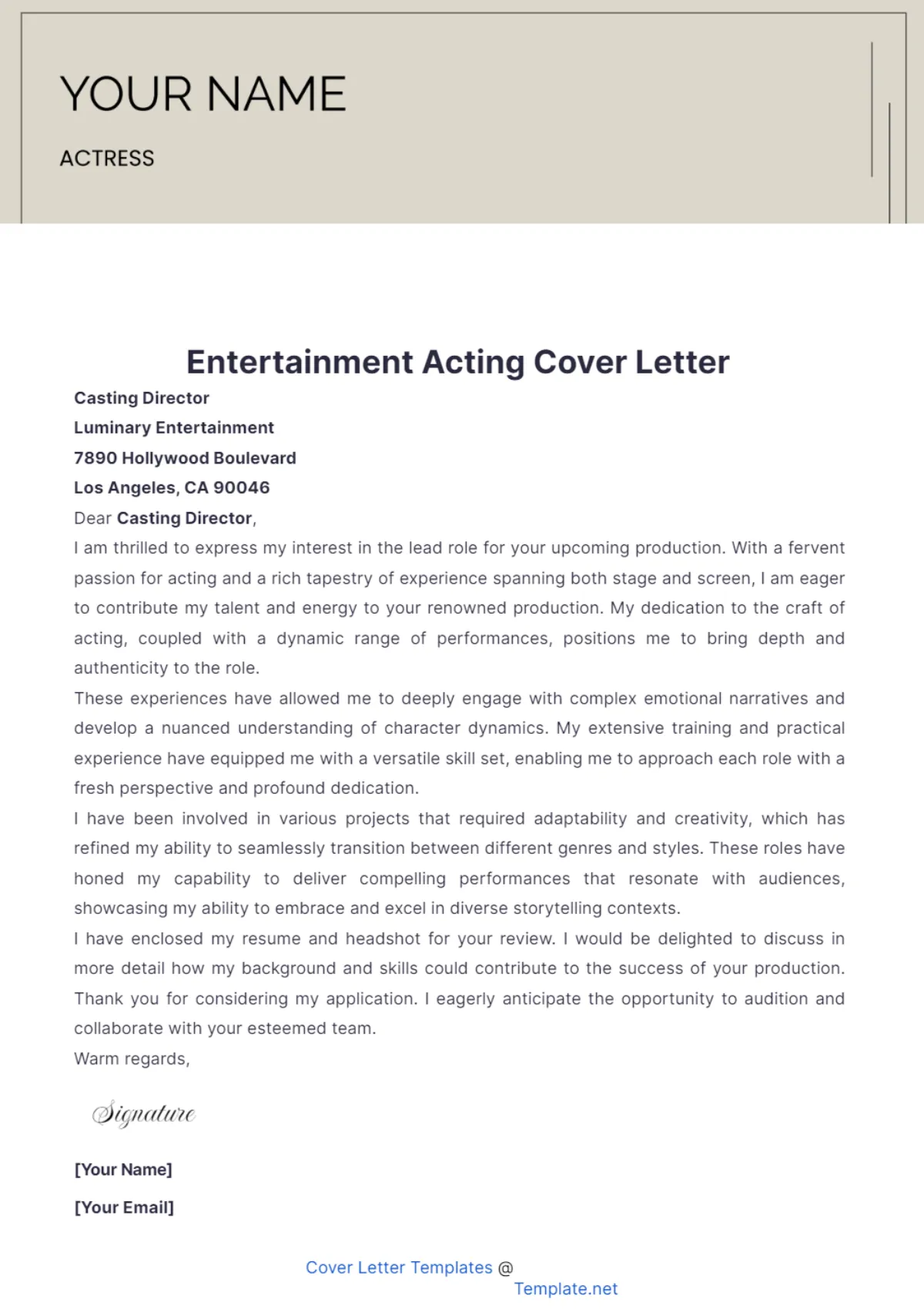
Use professional language throughout your cover letter, avoiding slang, jargon, or overly casual expressions. Maintain a positive and enthusiastic tone, showcasing your genuine interest in the opportunity. Be concise and clear in your writing, using strong action verbs to describe your accomplishments. Ensure that your language reflects the professionalism and standards of the entertainment industry. Proofread your work for any grammatical errors.
Proofreading and Editing
Before submitting your cover letter, proofread it carefully for any errors in grammar, spelling, or punctuation. Typos and grammatical mistakes can undermine your credibility and professionalism. Read your cover letter aloud to catch any awkward phrasing or inconsistencies. Ask a friend, family member, or career counselor to review your cover letter as a second pair of eyes can often catch mistakes that you might miss. Attention to detail is key in the entertainment industry.
Closing and Call to Action
Your closing paragraph should reiterate your interest in the position and the company. It should also include a call to action, encouraging the hiring manager to contact you for an interview. Express your enthusiasm and reiterate your commitment to the role. End with a professional closing, such as ‘Sincerely’ or ‘Best regards,’ followed by your full name.
Expressing Enthusiasm
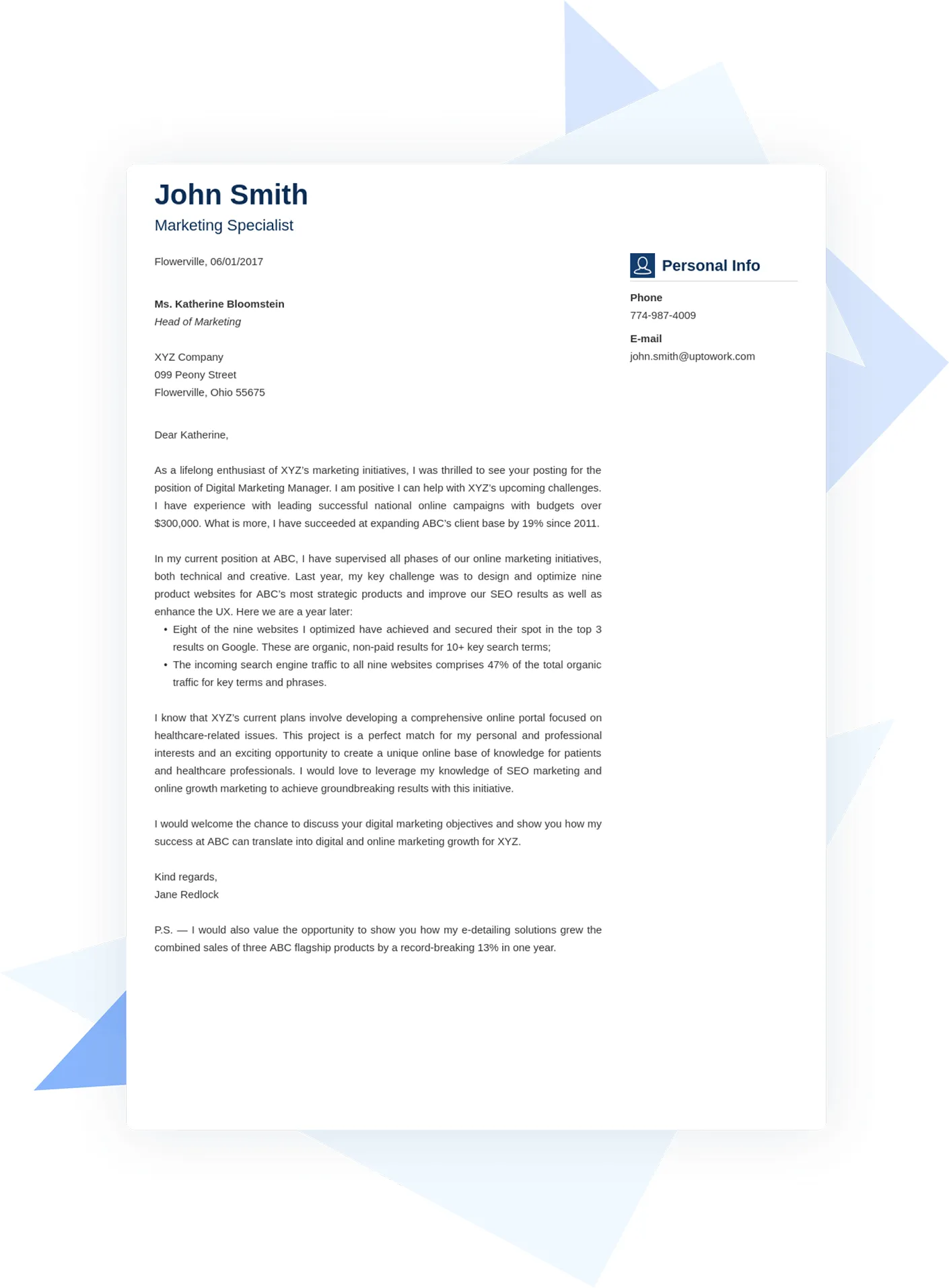
Reiterate your enthusiasm for the position and the company in your closing paragraph. Mention why you are excited about the opportunity and what you hope to contribute. Express your eagerness to learn more about the role and how your skills and experience can benefit the team. Showing genuine excitement can leave a lasting positive impression.
Providing Contact Information
Reiterate your contact information in your closing paragraph, making it easy for the hiring manager to reach you. Include your phone number and email address again, ensuring that they are accurate and up-to-date. You can also mention your availability for an interview and express your willingness to provide any additional information that might be needed. Make sure they know how to reach you.
